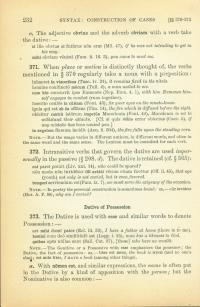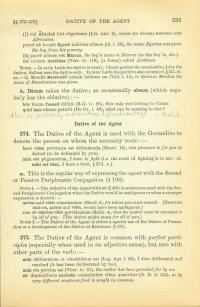373. The dative is used with esse and similar words to denote possession.
Est mihi domī pater (Ecl. 3.33)
I have a father at home.
(there is to me)
Hominī cum deō similitūdō est. (Legg. 1.25)
Man has a likeness to God.
quibus opēs nūllae sunt (Sall. Cat. 37)
[those] who have no wealth
Note— The genitive or a possessive with esse emphasizes the possessor; the dative, the fact of possession.
Liber est meus.
The book is MINE (and no one's else).
Est mihi liber.
I HAVE a book (among other things).
a. With nōmen est, and similar expressions, the name is often put in the dative by a kind of apposition with the person; but the Nominative is also common.
- cui Āfricānō fuit cōgnōmen (Liv. 25.2)
whose (to whom) surname was AfricanusPuerō ab inopiā Egeriō inditum nōmen (id. 1.34)
The name Egerius was given the boy from his poverty. - Puerō nōmen est Mārcus
The boy's name is Marcus(to the boy is, etc.).cui nōmen Arethūsa (Verr. 4.118)
[a fount] called Arethusa
Note— In early Latin the dative is usual; Cicero prefers the nominative, Livy the dative; Sallust uses the dative only. In later Latin the genitive also occurs (cf. § 343.d).
Q. Metellō Macedonicī nōmen inditum est (Vell. 1.11)
The name of Macedonicus was given to Quintus Metellus.
b. Dēsum takes the dative; so occasionally absum (which regularly has the ablative).
hōc ūnum Caesarī dēfuit (B.G. 4.26)
this only was lacking to Cæsar
Quid huic abesse poterit? (De Or. 1.48)
what can be wanting to him?


